By Earl Rickard
Joseph A. Gainard, captain of the American freighter City of Flint, hated to threaten his crew with piracy; the men were only reacting as any sailors would to the seizure of their ship by a foreign power. They wanted to take it back. Gainard wanted his ship back too, but the German boarding party was armed with automatic weapons and grenades.
The 49-year-old Gainard was armed only with his knowledge of international law and his common sense. The City of Flint’s cargo, according to the Germans, contained contraband items. The vague areas and technicalities of international neutrality laws put interpretation up for argument. The Germans won the argument; they had the guns.
Determined to take his ship back without loss of life, Gainard, a calm, intuitive, resourceful veteran Merchant Marine captain, played a four-week game of cat and mouse with his German captors. Gainard knew of the crew’s plots and that the Germans did too. So the captain told his crew that any challenge to the German authority “would probably be an act of piracy in any court in the world. “
On October 9, 1939, the 4,963-ton freighter City of Flint, six days and 1,500 miles out of New York harbor, steamed through another cloudy day on the North Atlantic bound for Great Britain. At 3:42 pm, First Mate Warren “Dusty” Rhoads, peering through his binoculars, said, “Is it a cloud?” Captain Gainard raised his binoculars to the horizon. “I don’t know,” he answered, “but it certainly is moving faster than the others if it is a cloud.” Gradually the “cloud” transformed into a ship with a battery of 11-inch guns pointing at the little freighter. The warship, steaming at 25 knots, was the German pocket battleship Deutschland.
Gainard slowed his ship and prayed the German captain would recognize the freighter as American; no other nation owned Hog Island ships. Closer inspection would also reveal the American flag painted on the ship’s side. Yet for Gainard and his crew, staring down the barrels of 11-inch guns, the sooner recognition came the better.
A collective sigh of relief came from the Americans when the Deutschland swung her guns inboard. When the German ship slowed, two signal flag messages flapped on the yardarms: “YOU MUST NOT USE YOUR RADIO,” and “I AM GOING TO SEND YOU A BOAT.” She pulled up close to the American’s port quarter and lowered a small boat. Gainard went below and replaced his dungarees and sweater with his full dress uniform.
Looking down from the bridge ladder, Gainard watched his first mate greet the boarding officer, who was followed by two officers and four or five armed sailors. All the Germans wore the uniform of the Kriegsmarine. When the three officers reached the top of the ladder, Gainard saluted then held out his hand and said, “Glad to have you aboard.” The senior officer shook the captain’s hand and said, “Captain, I am sorry to cause you inconvenience, but this is war. I must ask to see your papers.”
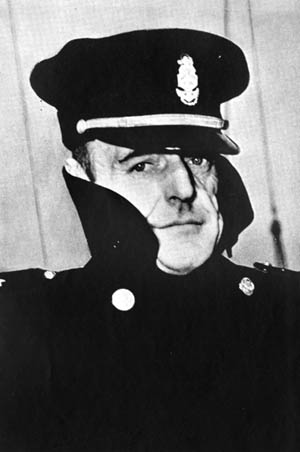
In the mate’s room on the bridge, Gainard showed the German officer the ship’s manifest: lumber, wax, asphalt, apples, canned goods, tractors, oil, grease, and general cargo. The grim-faced German officer said, “This is bad. You have 20,000 drums of oil on board. What kind of oil is it? “
Gainard told him it was lubricating oil.
“Under the laws of my country, “the German said, “you are guilty of carrying contraband to the enemy. “
Gainard reminded the German that the Flint was a U.S. ship, and under American law the Flint’s cargo was not contraband. Despite Gainard’s protests, the Deutschland’s captain ordered a prize crew to sail the City of Flint to Germany.
The Germans also asked Gainard if he could take on 38 English prisoners picked up after the sinking of the British merchantman Stonegate. Gainard agreed, and soon a boat came over carrying 18 armed German sailors and the Englishmen. Lieutenant Hans Pushbach, an experienced merchant officer and Imperial Navy officer, led the prize crew.
Gainard recalled in his biography Yankee Skipper, “Four of the crew were radio operators, but something had happened to the Flint’s radio between the time the Deutschland was sighted and the time the prize crew came aboard. The German radio operators evidently didn’t know enough about radios to fix it; consequently, they were unable at any time to receive messages from Germany.”
Speaking passable English, Pushbach told the crew, “You are now bound for Germany. My soldiers will be a military guard and you will get all your orders from your Captain. You must obey these. If there is any interference or refusal I will kill you.” The sidearms and grenades each German carried and the machine gun they brought aboard backed up Pushbach’s threat. The German then apologized for having to take these actions but reminded the crew that his country was at war and, “Whether we like it or not we must do certain things we would not do ordinarily.”
After the Deutschland vanished into the North Atlantic mists, Captain Gainard stated his view of the situation to Pushbach: “The warship is gone. How far we don’t know. It may be just over the horizon. But you are not going to use the radio. You’re not going to sink the ship because the last thing your country wants is a war with mine. My crew must not do anything which would cause you to want to sink the ship. I know my country doesn’t want a war. So here we are. You can’t move without my crew, so therefore I must be in command of this ship.”
Pushbach said, “Fine!”
The German officer traced a course on the North Atlantic chart that skirted north of the Orkney Islands. Gainard shook his head and said, “It’s too dangerous.” He explained that neither of their governments would want the ship to encounter any belligerent warships that might force the Germans to defend themselves. The American drew a more northerly course. Pushbach not only agreed but told Gainard the Deutschland’s captain suggested the same course.
Gainard later wrote, “He knew he could trust me on routine matters and he knew that no American on board would do the things they would like to do and on several occasions planned to do.” Gainard also knew well the neutrality laws and the international rules of the sea and hoped to rid himself of his captors peacefully within those rules before the ship could reach Germany. Now the double cat and mouse game began, the Flint trying to avoid confrontation with Allied ships and her captain trying to outsmart Pushbach.
Dodging icebergs, the City of Flint steamed well north of the Orkneys. The daily tedium of plowing through the cold, dark North Atlantic waters led to increased grumbling by the crew. Two German guards always maintained a watch on the bridge deck while others slept there. Pushbach slept in the chief officer’s room near the wheelhouse. All the Germans brandished revolvers in plain sight and carried grenades in their pockets. “Despite the strain,’ remembered Gainard, “we were peaceful enough on the surface.” Some of the Germans fraternized with his crew. Gainard assumed they understood English but pretended otherwise. The Germans would watch card games in the crew’s quarters and listen to the conversations, then report to Pushbach. Pushbach would then come to Gainard and say, “Well, tonight I think we have monkey business.”
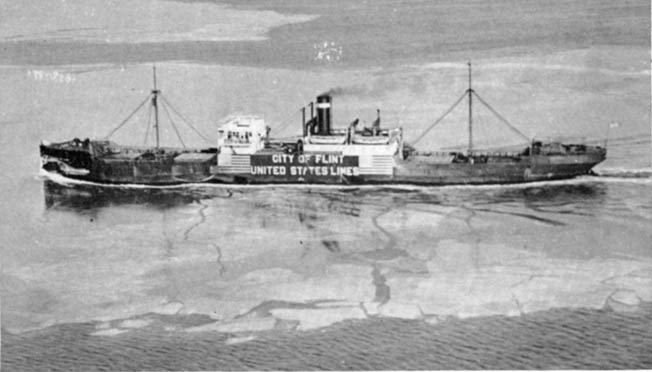
photographed in the Chesapeake Bay on its return to the United States.
Gainard counted nine plots. Most plots fell apart for reasons that Gainard patiently explained to the crew. The captain continually reminded his crew about the weapons, the grenades, and that “the Germans—under international law—had a legal right to be on the ship.” Piracy charges might await the crew if they challenged Pushbach and his men. Besides, Gainard told them, their overt actions could upset American State Department efforts on the Flint’s behalf. But did the State Department know what had happened to the City of Flint? Did anyone?
When the Flint’s scheduled October 12 position report to the United States Lines failed to materialize, the company (operating the ship under charter) began to worry. Soon both the line’s office in England and the State Department tried but failed to contact the ship. The German radiomen failed to fix the ship’s radio, and Pushbach barred the ship’s crew from the radio room. The shortwave radio sets on board picked up English, American, and German newscasts, but the newscasts mentioned nothing about the City of Flint. The crew sensed that the world neither knew nor cared about their disappearance.
While Gainard stopped all violent attempts to take back the ship, the wise old captain began to work on his own plot. When Gainard calculated that the ship was approaching land, he and Chief Engineer Logan played out a little drama for the benefit of Lieutenant Pushbach. Logan came to the bridge and said, “Captain, our water is running short, what with all these extra hands on board. How soon do we reach port?” Gainard told the chief engineer that he did not know, but he suggested that Logan sound the tanks. After enough time elapsed to sound the tanks, the chief engineer returned to report sufficient water for only a few more days. Both men knew the ship had plenty of water, and Gainard knew international law. “We had a perfect right to put in anywhere for water,” Gainard later wrote, “but, if we put in when we didn’t need it we would be subject to internment and the prize crew removed.”
By the time the ship reached the Norwegian coast, Pushbach had become so worried about the water he decided to stop at the nearest port. Eleven days after the boarding, flying the German merchant flag and with all the American flag markings painted out by Puschbach’s men, the City of Flint sailed into the darkened harbor of Tromsoe in neutral Norway.
Unfortunately for the Americans, the Norwegians watered the ship without checking the full tank the Flint had yet to tap. The Norwegian Neutrality Control and Customs officers refused to allow any Germans or Americans to go ashore in violation of Norway’s neutrality laws. The captured British sailors, however, left the ship for internment in Norway. The Norwegians ordered the Flint out of their territorial waters, and they ordered the Germans to repaint the American flag on the ship’s side.
“Lieutenant Pushbach was on the spot,” remembered Gainard. “He had no direct orders from his government, our radio failure prevented that. I was just as worried as he was. We both wanted to keep the Flint safe…. He wanted to get her to Germany…. I wanted to get her free.” The two men, hoping to evade both British and German warships and a fierce southeasterly storm, chose a northerly route skirting the Norwegian coast and heading toward Russian waters.
Soon after setting this course, a German radioman complained of stomach pains that suggested appendicitis. The Flint would have to put into a Russian port quickly or the sailor would die. At this early stage of the war, with the ink barely dry on the Hitler-Stalin Pact of August 1939, Pushbach decided to take a chance on Germany’s new ally, the Soviet Union. On Monday, October 23, the City of Flint sailed into Murmansk harbor flying a makeshift German naval ensign.
Meanwhile, the stop at Tromsoe had alerted the world to the international situation taking place north of the Arctic Circle. On October 23, the United States Maritime Commission, the Flint’s owner, issued an official statement announcing the Flint’s seizure on October 9 and the ship’s subsequent odyssey across the Atlantic. The commission sought “further information concerning the seizure. “Later that evening, the U.S. State Department sent queries about the ship to the American consul in Oslo and to the embassy in Moscow.
When the Russians boarded the ship, their doctor diagnosed appendicitis for the German sailor; the Russian naval port officer ordered internment for the prize crew. The boarding officer checked Gainard‘s papers and declared the ship free. The Russian told Gainard he could leave or stay as he liked. The Russian then asked, “How soon can you leave?” Desiring to overhaul one of his boilers following such a long trip, Gainard thought immediate travel unnecessary. Gainard reasoned, “We were a free neutral ship in a supposedly neutral country.” The Russian told Gainard that the Flint could sail “whenever you are ready, after your papers are returned by the customs men.”
The first night in port Gainard gave the customs men a message for Laurence Steinhardt, the American ambassador in Moscow. Gainard heard nothing from the embassy the next day, so he gave the Russians the message again. Again nothing. Gainard then asked to go ashore and phone the ambassador. The customs men told him, “Tomorrow.” Tomorrow never came. After three days of tomorrows, Gainard signaled the Russian neutrality patrol boat stationed astern that he wanted a boat to go ashore. The reply was signaled, “We cannot supply a boat and you must not use your own boat.”
“We were just as much isolated,” Gainard felt, “as if we had been hung up on a reef in the South Pacific.”
Speculation about the strength of the Soviet-German pact had been rampant since the Flint’s arrival in Murmansk. The American government inquired about the crew’s health and safety and requested the ship’s return. Soviet authorities in Moscow stalled Ambassador Steinhardt at every turn. President Franklin D. Roosevelt, at his weekly press conference, stated his hope for the ship’s safe return. “Such a request,” wrote the New York Times, “would test the status of Soviet neutrality.”
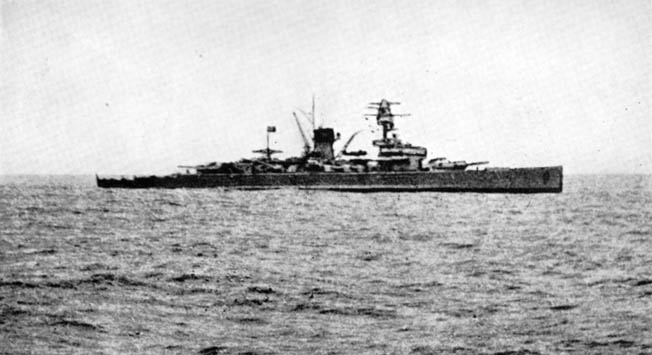
The world knew more about the beleaguered ship than the Flint’s men did. Listening to their shortwave radios, the shocked crew heard the famous American newscaster Lowell Thomas tell the world that the Germans were back aboard. Twenty-five minutes later, the Russian port officer returned with the German prize crew. He told Gainard to sail within 24 hours. Obviously, someone higher in the Soviet government had reversed the original decision.
Captain Gainard, hearing nothing from the American ambassador, weighed anchor. After five days as a free ship, the Flint sailed out of Murmansk harbor for the ultimate destination of Germany, her captors back aboard, and the Soviet customs boat training its deck gun on the American freighter.
With Pushbach on the bridge of his legal prize, Gainard had to keep the Flint away from British warships; therefore, he sailed within Norway’s three-mile limit, dodging in and out of the fjords. Suddenly, through the mist a small warship appeared—the Norwegian destroyer Stegg. Steaming to starboard, the Stegg failed to alarm Gainard. “I thought it to be friendly from the position it took—outboard instead of ahead of us.” Stegg escorted the Flint into Tromsoe harbor to meet the neutrality patrol.
After issuance of the proper permits, the Flint sailed from Tromsoe escorted by Stegg and another destroyer, Aegger. That night a Norwegian minelayer, Olaf Tryggvason, joined the little flotilla. Gainard discerned that the minelayer’s captain was superior in rank to the other captains. “From his actions and the actions of the destroyers I knew they were friendly,” remembered Gainard. The ships continued south through the fjords.
In the darkness of the following night, a searchlight beam flashed through the frigid air and lit the Flint’s icy deck. The Olaf countered with her searchlight and revealed a British cruiser. The Norwegians sent a blinker message in English: “We are operating in Norwegian territorial waters.” The cruiser blinked back: “Sorry. We do not wish to intrude but we would have liked to include your friend in our convoy.” Spurned by the Norwegians, the British ship and three consorts sailed out into the Norwegian Sea.
When the Flint began to run out of Norwegian waters, Gainard’s hopes for freedom rapidly diminished. Therefore, when a crewman came to the captain for treatment of scraped shins, Gainard asked for a doctor from the Olaf. “The man was not sick,” Gainard recalled. “At no time was this man sick enough to require a doctor, but Lieutenant Pushbach either did not know that, or chose to ignore it.” The Olaf’s doctor and a line officer came aboard. While the doctor cared for the crewman, Gainard escorted the officer around the ship including the Germans’ quarters. “I wanted him to see everything,” remembered Gainard.
Getting underway again, the ship headed south and soon passed close aboard the German cargo ship Schwaben. From the German ship’s bridge, someone yelled in German, “Do not pass Haugesund. Anchor there and see the consul.” Gainard speculated that the German government wanted to give Pushbach orders. Certainly, Berlin knew about the British cruiser lurking in these waters.
Pushbach went over Gainard’s head for the first time on the voyage when the German asked Chief Engineer Logan whether the Flint could have “engine trouble.” Logan answered, “We can’t have engine trouble or any other kind of trouble unless the old man says so.” Gainard knew that if he claimed engine trouble, a valid excuse for entering port, the German prize crew could not be removed and his last chance at freedom for the Flint would be lost.
Gainard decided to appeal to the German’s Teutonic superiority: “Surely Norway, a small neutral nation, would not care to antagonize your country…. You have been ordered to anchor, by all means anchor.”
Pushbach answered, “I will anchor.”
The wily American replied, “Do you order me to come to anchor?”
“Yes, we must anchor.”
The Flint dropped her hook in Haugesund harbor on the evening of November 3. Puschbach tried to convince the Norwegian authorities that the ship stopped because of the lightly injured sailor, a valid excuse under international neutrality laws. Gainard thought the extent of the injury made it a poor excuse. Nightfall saw the Olaf Tryggvason anchor close aboard the Flint. Gainard thought, “Something was up.”
When midnight approached so did a boarding party of 30 armed sailors from the Olaf. “It was slick, the way they did it,” remembered Gainard. “They simply woke the Germans up, took away their artillery and told them they had lost their rights.” Norwegian neutrality laws forbade “anchoring without legal cause.”
The Norwegian in charge, Captain Dynsor, told Gainard, “In a little while I’ll have some good news.” Gainard smiled and said, “I don’t need to wait a little while. It is good news to see you.”
Dynsor’s men escorted Pushbach and his prize crew to the Norwegian boats. The Flint’s crew showed no hostility to the Germans. Instead they helped them over the side as if they were old friends. Of course, the crew remained wary; the Germans had left before and then returned. Overjoyed, the American sailors lowered the German flag and ran up the Stars and Stripes.
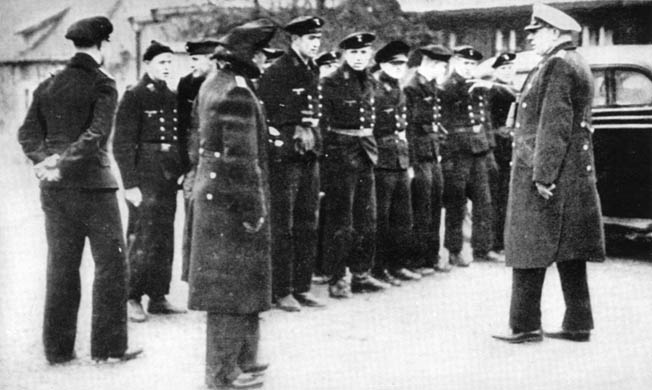
Within a few hours, City of Flint pulled up anchor, and Gainard set course for Bergen, Norway. Accompanied by two Norwegian ships, the American freighter sailed into Bergen harbor on November 4. On that day in Washington, D.C., President Roosevelt signed the joint resolution passed by Congress the previous day that would eliminate another Flint incident: cash and carry. The resolution lifted the American embargo on the sale of arms and ammunition to belligerents, who were now allowed to purchase war goods with cash and then carry them away in their own ships. Furthermore, the resolution gave the president the right to set up a combat zone in European waters that barred American vessels. In what sounded like an ultimatum, Berlin protested Norway’s actions and demanded the ship’s return. Hitler’s government soon tired of the incident and let it fade away.
Gainard and his crew received a hero’s welcome in Bergen, where they left the ship for the first time since they boarded her in New York more than a month earlier. Gainard met the American consul, who prepared a radio hookup so the American captain could tell his story to the world. In line with Gainard’s efficient Yankee ways, he spoke for only 12 minutes.
On January 27, 1940, the now famous Hog Island freighter SS City of Flint sailed into Baltimore harbor. The night before, captain and crew had listened to radio commentator Lowell Thomas add his conclusion to the incident: “City of Flint is coming through the Virginia Capes again back from her odyssey, just a rusty piece of junk, bound for the bone yard.”
“No!” wrote Gainard in his biography, “A freight ship is no thing, Mr. Thomas, she’s my home … good enough to be the home of a crew of officers and sailors, and good enough to carry the cargo of American manufacturers to all the world—she’s no pile of junk!”
And her captain was no ordinary captain.
Author Earl Rickard is a resident of Reno, Nevada. This article is his first contribution to WWII History magazine.
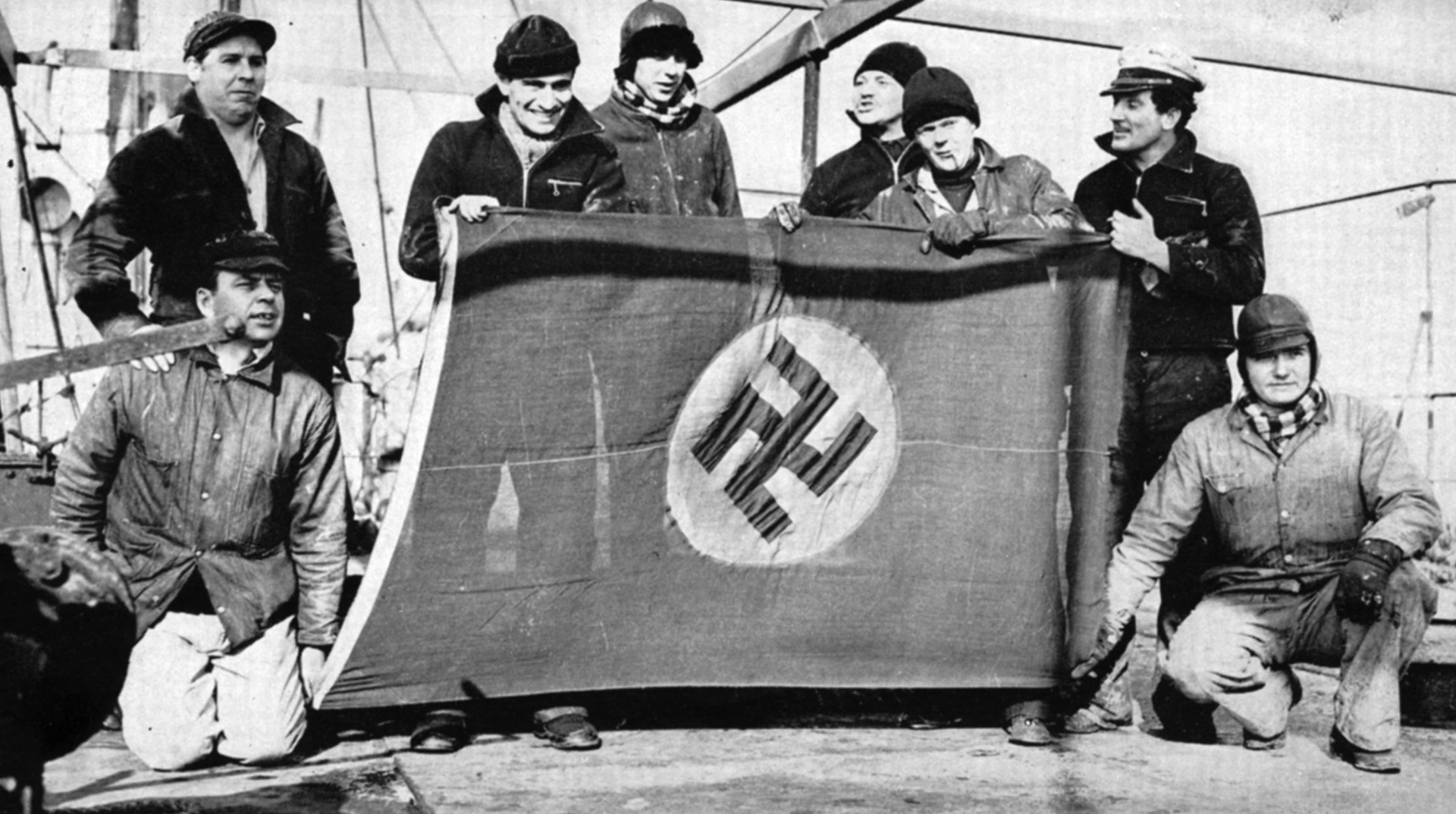
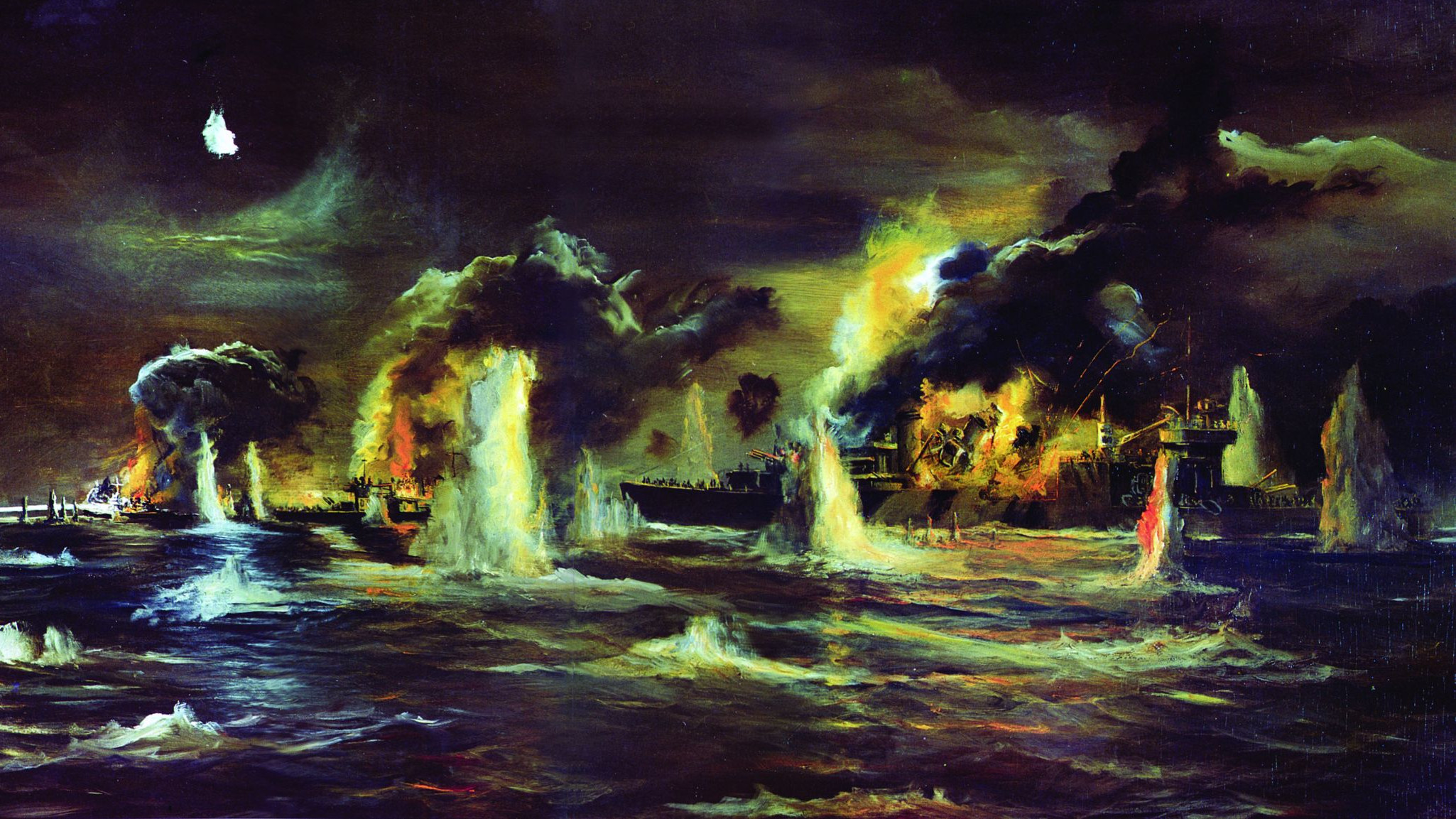

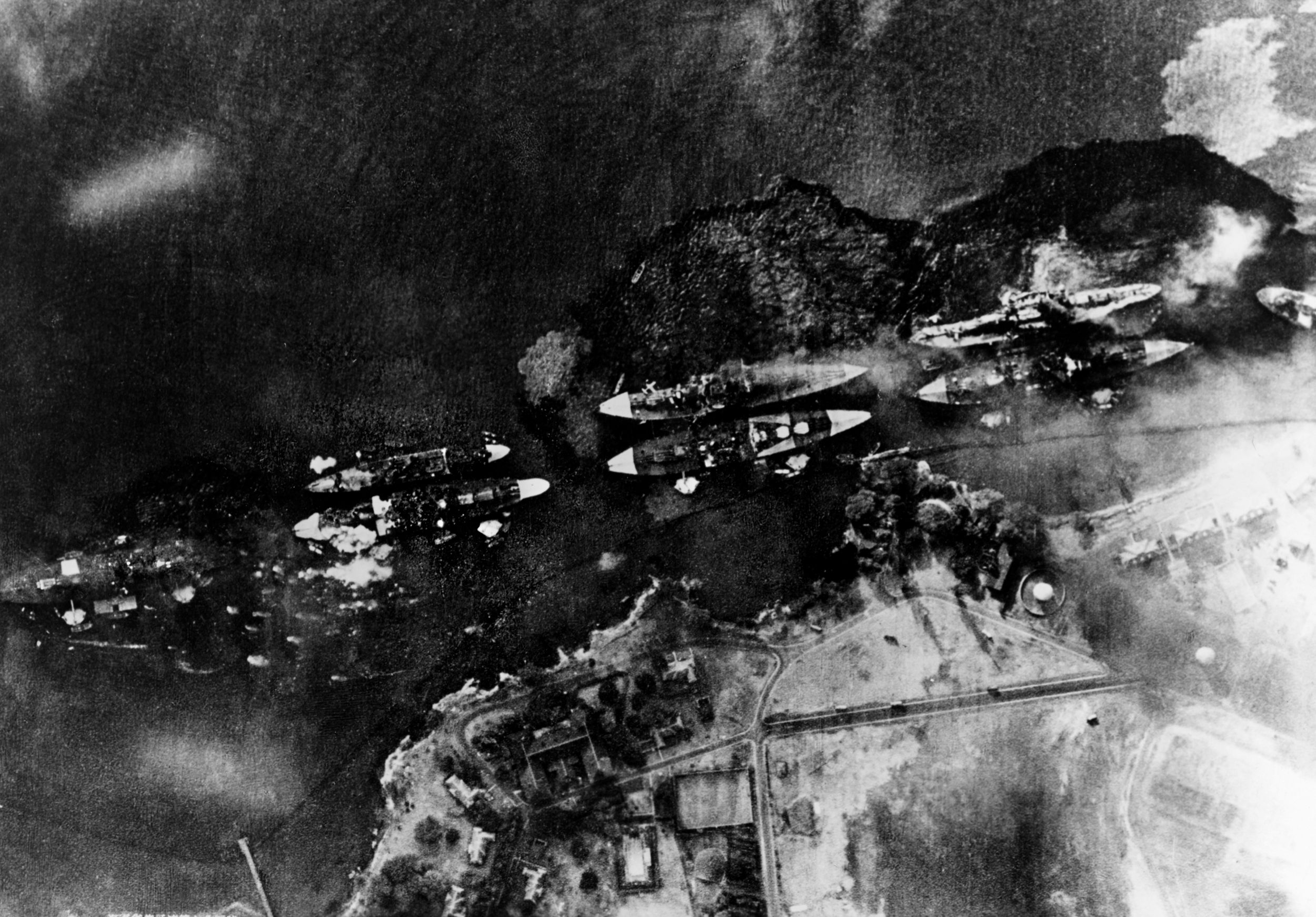
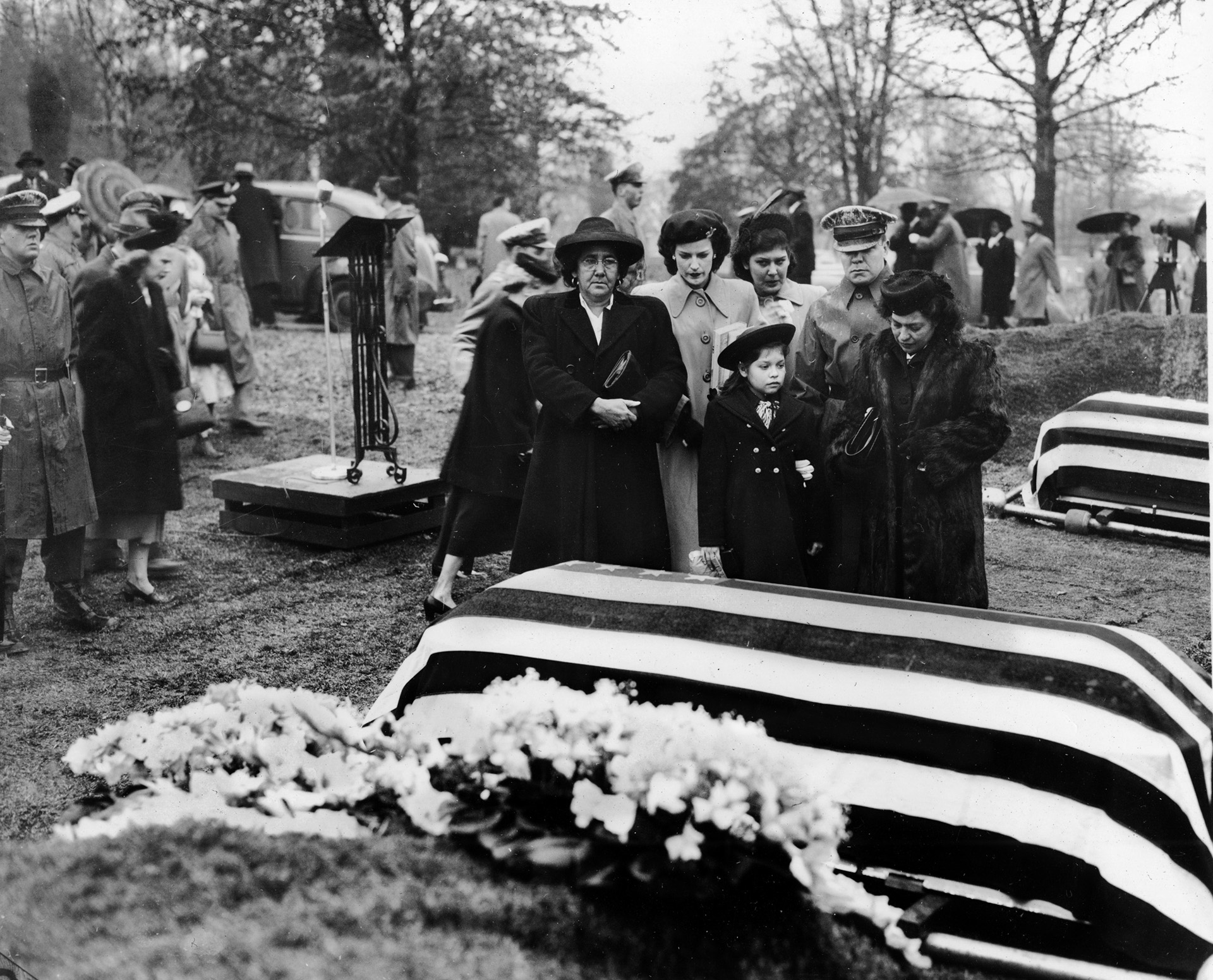
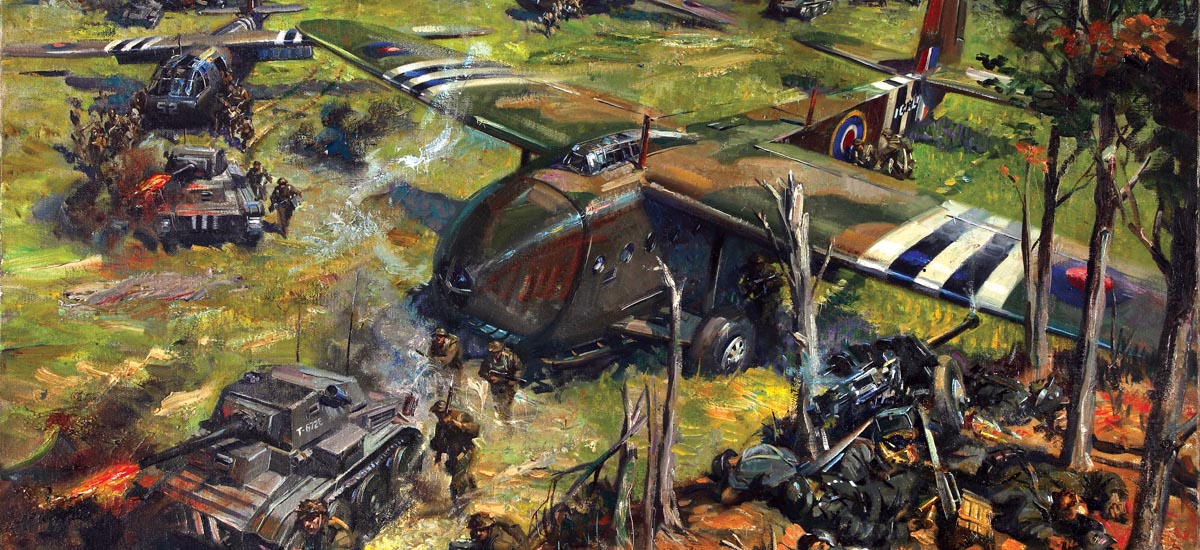

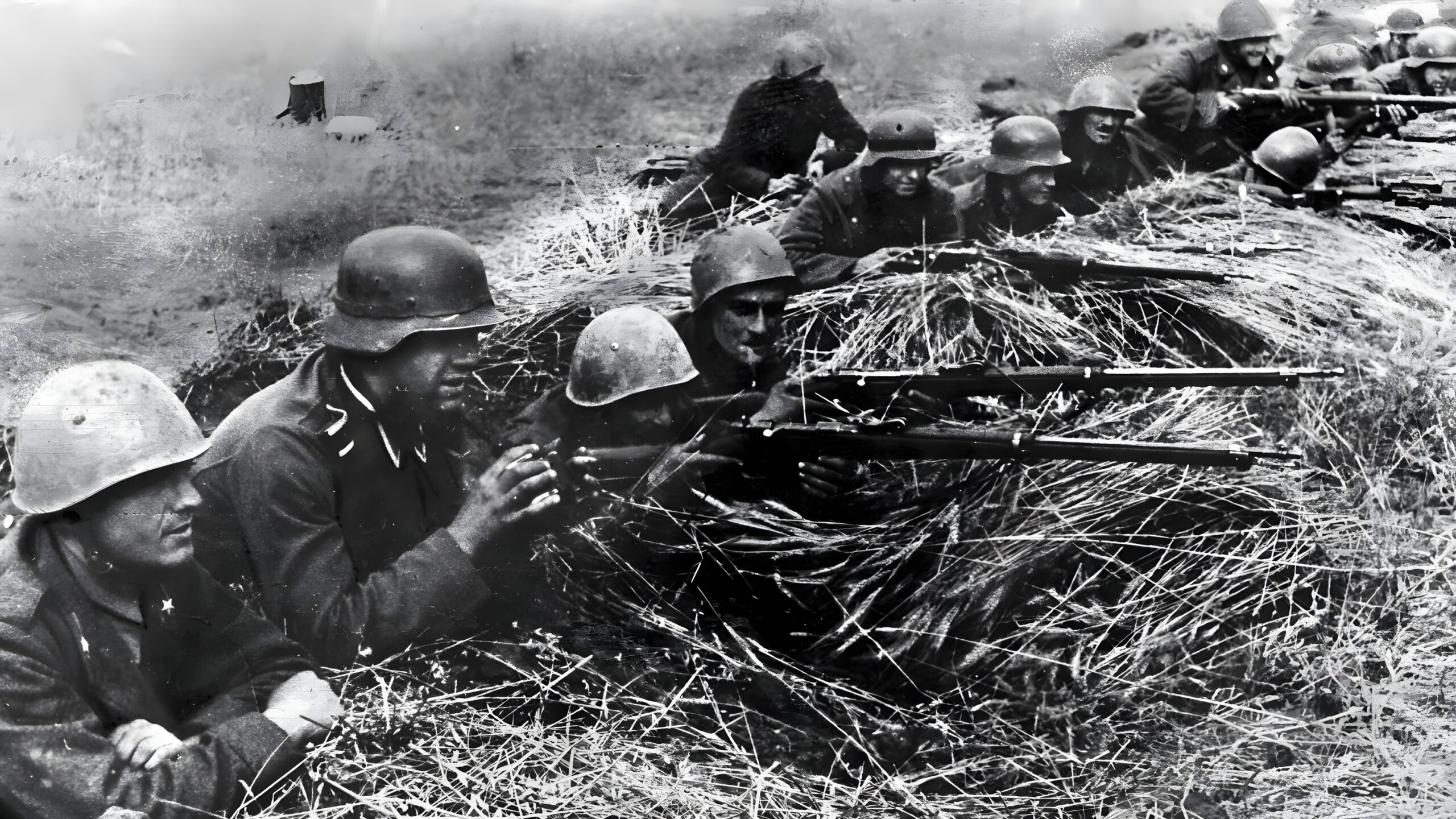
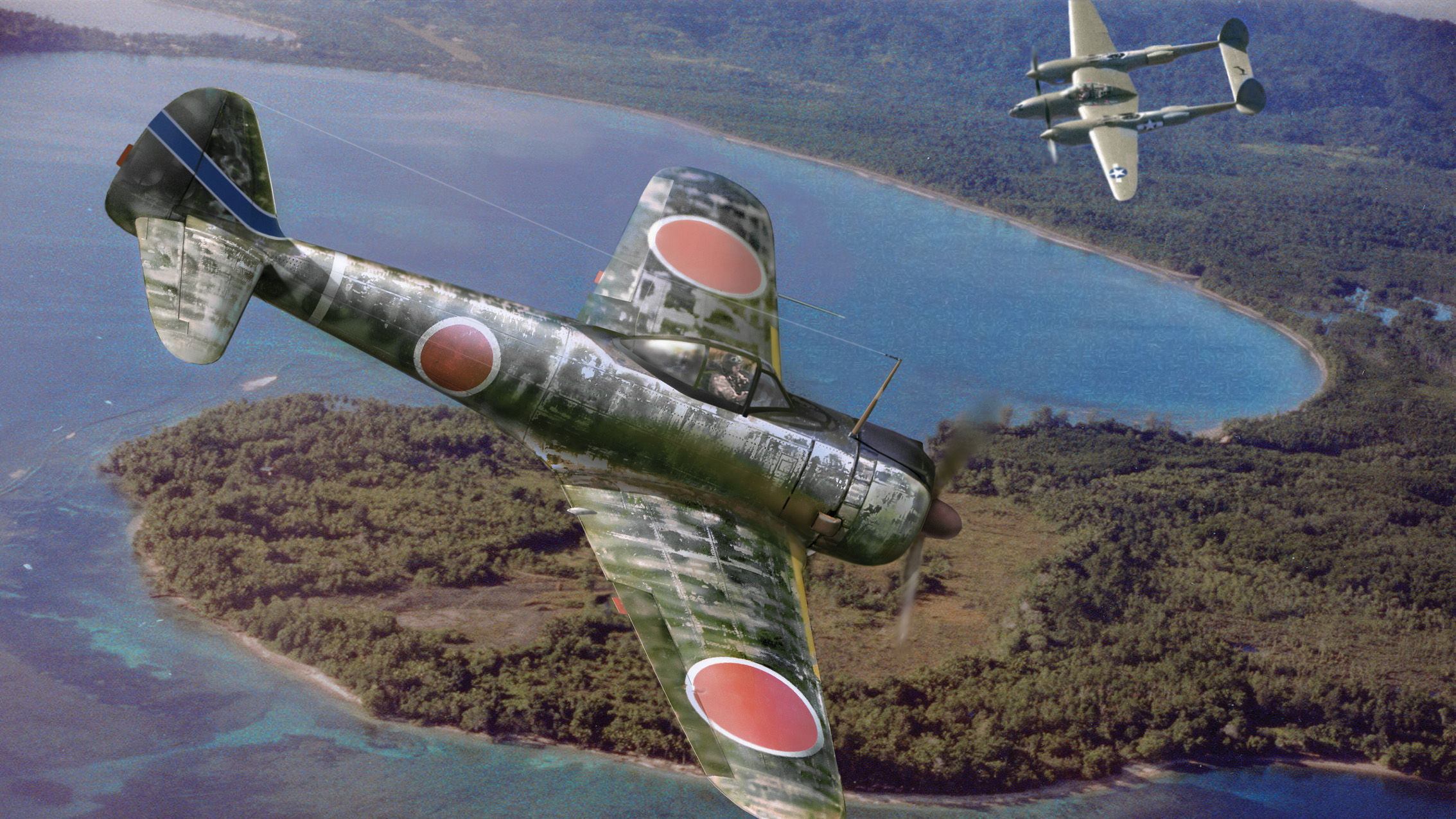
A fantastic story. Would make a good movie.
Thank you Earl. One of those Great War stories where intelligence an humanity prevails. No one dies this time. If only it was always like that and we all get home. Cheers from Roy [ex-Provost]
Thank you Earl. One of those Great War stories where intelligence an humanity prevails. No one dies this time. If only it was always like that and we all get home. Cheers from Roy [ex-Provost]
Great story. I see a book on the SS City of Flint incident is coming out. BTW, “the wise OLD captain” “49-year-old Gainard”. Cheers!
Really great story. I’m curious in relation to the fate of the German crew. What happened to them? Were they interned in Norway for the rest of the war, or somehow where returned to Germany?